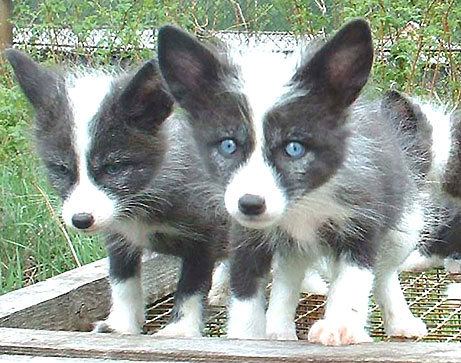
In 1959 a Russian scientist set out to create what you're seeing today - and the results may help understand how human intelligence operates.
These ARE foxes - bred
specifically for certain traits.
Both Belyaeve and Trut selected foxes for one criterion only – tameness, which was evaluated by the foxes' reactions to their human keepers. If they were vicious, they didn't join the experimental population. If they showed slight fear and friendliness, they did. To ensure that their tameness resulted from genetic selections, the scientists didn't train the foxes and their contact with humans was limited to brief, behavioural tests.
Now, 40 years and 45,000 foxes later, Trut has a unique population of 100 foxes that are docile and eager to please. They snarl fiercely at each other for the attention of their human handler. Each of them is a product of between 30 and 35 generations of selection.
 The specially domesticated foxes are not only socially adept, adds Hare, they are regular charmers. "They behave like dogs," he says. "They whine and bark, they wag their tails, they pee for joy, and they just want to cuddle with you."
The specially domesticated foxes are not only socially adept, adds Hare, they are regular charmers. "They behave like dogs," he says. "They whine and bark, they wag their tails, they pee for joy, and they just want to cuddle with you."
But don't expect fox kits to be appearing in pet stores any time soon. The foxes have a pungent musk and love to dig and hide food, says Hare. "They would bury your food in your sofa and you would only find it three months later."
The interesting side-effect, the one they didn't count on, was that the domesticated foxes became smarter and more able to "read" humans. Dogs are thought to be smarter than wild wolves because they can interpret human signals such as pointing.
But the domesticated foxes are becoming "smart" too:
Researchers put puppies and fox kits through a series of experiments where the animals had to find hidden food, with a human researcher's gestures as the only clue to its location.
Both the puppies and the foxes bred for tameness found the food with about the same level of success. Both did significantly better than foxes bred at the same facility that hadn't been selected for tameness.
The results surprised Brian Hare, the study's lead author, who conducted the research while a Harvard doctoral student.
"I did not think the experimentally domesticated foxes would perform as well as dogs," Hare said. "In fact, I thought that in their failure, it would prove that dogs possessed their unusual ability to use social cues not because they are domesticated, but because this ability was under direct selection. ... Smarter dogs survived better [with humans] and passed on their 'smart genes' to the next generation."
The notion is that we didn't get smart because of 100% natural selection; we became smart because we found a distinct advantage to becoming SOCIAL.
This is a nasty finding for hermits like me!